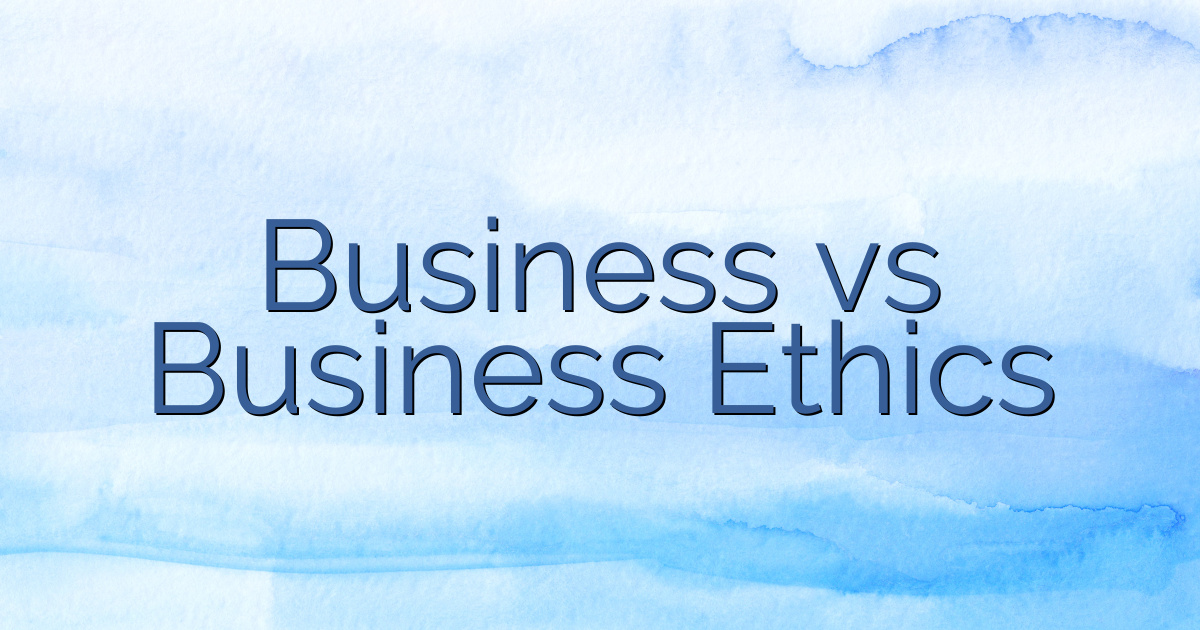 Are you torn between pursuing a career in business or business ethics? Wondering which path will lead to greater success and personal fulfillment? Look no further!
In this article, we’ll delve into the world of business vs. business ethics, comparing their majors, curricula, career opportunities, and salary potential.
By the end, you’ll have a clear understanding of the similarities and differences, allowing you to make an informed decision that aligns with your goals and values.
So, let’s dive in and explore the exciting possibilities that lie ahead!
Are you torn between pursuing a career in business or business ethics? Wondering which path will lead to greater success and personal fulfillment? Look no further!
In this article, we’ll delve into the world of business vs. business ethics, comparing their majors, curricula, career opportunities, and salary potential.
By the end, you’ll have a clear understanding of the similarities and differences, allowing you to make an informed decision that aligns with your goals and values.
So, let’s dive in and explore the exciting possibilities that lie ahead!
Table of Contents
Key Takeaways – Business vs Business Ethics
- Both business and business ethics majors focus on moral principles and values in business practices.
- Both majors provide a foundation in business principles such as management, marketing, finance, and operations.
- Both programs emphasize ethical decision making and social responsibility.
- Both majors aim to prepare students for ethical challenges in their careers and recognize the importance of ethical conduct in business.
Overview of the two business majors
If you’re interested in studying business, you’ll have the option to choose between two majors: business and business ethics. Business ethics focuses on the moral principles and values that guide decision making in the business world. The field emphasizes the importance of ethical conduct, sustainability, and social responsibility in business practices. In contrast, the business major covers a broader range of topics related to management, marketing, finance, and operations. While both majors provide a solid foundation in business principles, business ethics places a stronger emphasis on ethical decision making and the impact of business actions on society and the environment. Students studying business ethics will explore various ethical decision-making models, such as the Utilitarian, Deontological, and Virtue ethics models, to analyze and resolve ethical dilemmas in a business context.Overview of the curriculum and coursework of the two majors
The curriculum and coursework for the two majors provide an overview of their respective focuses. In business, the coursework content revolves around topics such as accounting, finance, marketing, and management. Students are exposed to real-world scenarios through case studies and projects, enabling them to develop practical skills. On the other hand, business ethics coursework content emphasizes the importance of ethical decision making in the business world. The curriculum delves into topics like corporate social responsibility, ethical frameworks, and stakeholder analysis. Through discussions and ethical dilemmas, students learn to navigate complex situations and make morally sound choices. Both majors aim to equip students with the knowledge and skills necessary for success in their chosen fields, whether it be in traditional business practices or in incorporating ethical considerations into decision making.Overview of coursework, assessments, and ethical considerations
To succeed in your coursework and assessments, you should carefully consider the ethical implications of your decisions. The challenges that may arise in your coursework require you to make ethical decisions that align with your values and the professional standards of your field. Ethical decision-making involves evaluating the potential consequences of your actions and choosing the course of action that promotes fairness, integrity, and responsibility. As you navigate through your coursework, you may encounter scenarios that test your ethical judgment and problem-solving skills. It is important to approach these challenges with an open mind, seeking to understand the perspectives of all stakeholders involved.Comparison of Soft Skills Developed
As you navigate through your coursework, you’ll notice a clear difference in the development of soft skills. While your business courses may focus on technical skills and knowledge, ethical decision-making and business ethics training are crucial components for developing soft skills in the business world. Here are four key ways in which ethical decision-making and business ethics training can enhance your soft skills:- Critical thinking: Business ethics training encourages you to analyze complex situations and make informed decisions based on ethical principles, fostering critical thinking skills.
- Communication: Ethical decision-making requires effective communication with stakeholders, which helps improve your communication skills.
- Leadership: Business ethics training emphasizes the importance of leading with integrity and ethical values, enhancing your leadership abilities.
- Emotional intelligence: Ethical decision-making involves considering the impact on others, promoting empathy and emotional intelligence.
Comparison of Career Opportunities and Job Roles in Business Ethics
When considering career opportunities and job roles, you’ll discover that there are a variety of paths available in the field of business ethics. Business ethics professionals play a crucial role in promoting ethical practices within organizations. They are responsible for ensuring that companies operate in an ethical and socially responsible manner. Some career opportunities in business ethics include becoming an ethics officer, compliance manager, or sustainability consultant. These roles involve developing and implementing ethical policies, conducting ethical audits, and providing guidance to employees on ethical decision-making. Other job roles in business ethics include corporate social responsibility manager, ethics consultant, and business ethics trainer. These positions involve working closely with management and employees to create a culture of ethical behavior and ensure compliance with ethical standards. Overall, pursuing a career in business ethics offers exciting opportunities to make a positive impact on organizations and society as a whole.Comparison of Salary Potential in Business Ethics and Business Administration
If you’re considering a career in either business ethics or business administration, it’s important to compare the potential salaries of these fields. Both fields offer promising salary potential and opportunities for career growth. In business ethics, professionals who specialize in promoting ethical business practices can expect to earn competitive salaries. The demand for individuals with expertise in business ethics is growing, as companies strive to maintain ethical standards and reputation. On the other hand, business administration offers a wide range of job roles, including management, finance, marketing, and human resources, which can lead to lucrative career paths. With the right skills and experience, business administrators can climb the corporate ladder and enjoy significant salary increases. Ultimately, the salary potential in both fields depends on factors such as education, experience, industry, and location. It’s crucial to research and assess your own career goals and interests to make an informed decision.Similarities between business and business ethics curricula
Take a look at the similarities in the curricula of both business and business ethics programs. In both programs, you will find a strong emphasis on ethical decision making and the application of business ethics principles. The courses offered in both programs cover core business topics such as marketing, finance, and management. However, in business ethics programs, you will also find specialized courses that focus on ethical theory, corporate social responsibility, and ethical leadership. These courses aim to develop your understanding of ethical frameworks and equip you with the skills to make sound ethical decisions in the business world. Both business and business ethics programs recognize the importance of ethical conduct in business and aim to prepare students to navigate the complex ethical challenges they may face in their careers.Difference in job prospects between the two majors
Now that you understand the similarities between business and business ethics curricula, let’s discuss the difference in job prospects between the two majors. While both majors can lead to successful careers, there are some distinctions to consider. A degree in business can open doors to a wide range of job opportunities, including roles in management, finance, marketing, and entrepreneurship. On the other hand, a focus on business ethics can lead to more specialized roles centered around ethical decision making and ethical leadership. These positions may include ethics officer, compliance manager, or corporate social responsibility specialist. Companies today are placing a greater emphasis on ethical practices, making ethical leadership a valuable skill in the job market. Ultimately, your career path will depend on your interests and goals, so it’s important to weigh the job prospects of each major before making a decision.How Do Business Ethics Impact Risk Management in a Business Setting?
Business ethics play a crucial role in business risk management comparison. When a company adheres to a strong code of ethics, it can mitigate potential risks such as legal issues, reputational damage, and financial losses. Ethical behavior creates a culture of accountability and transparency, reducing the likelihood of risky situations arising.
Factors to consider when choosing between business and business ethics majors
When deciding between a business major and a business ethics major, there are several factors to consider. One important factor is the development of ethical decision-making skills. A business ethics major provides a strong foundation in understanding ethical principles and applying them in real-world business scenarios. This knowledge can be invaluable in today’s corporate climate, where ethical dilemmas are increasingly common. Another factor to consider is corporate social responsibility. A business ethics major often focuses on the ethical responsibilities of businesses towards society and the environment. This knowledge is highly sought after by companies that prioritize sustainable and socially responsible practices. To help you make an informed decision, here is a table comparing the key aspects of a business major and a business ethics major:| Business Major | Business Ethics Major |
|---|---|
| Emphasis on traditional business concepts | Emphasis on ethical principles |
| Focus on profit maximization | Focus on ethical decision-making |
| Limited understanding of corporate social responsibility | In-depth knowledge of corporate social responsibility |
| Greater job opportunities in various industries | Potential for specialized roles in ethics and compliance |

